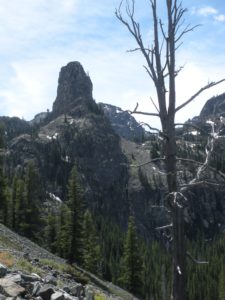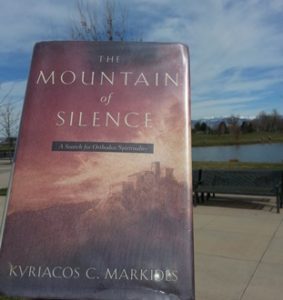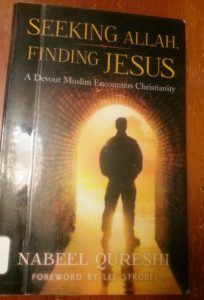
It is interesting to me to see the actions of God shortly after Adam and Eve left the garden. In Genesis 4, the Bible records the first murder, that of Abel by the hands of his brother Cain. Murder in and of itself is not that interesting as it is actually kind of common in this crazy, messed-up world. What is interesting is how Cain was treated. Three things could have happened after the murder. First, the people in the area (Cain’s family – Adam, Eve, siblings, or their descendants) could have gathered together and punished Cain for his deeds. In modern terms, this would be a type of democratic society in which the people decide what is right and wrong according to popular vote or what is best for society. In other words, society as a whole becomes the king who determines what is right and wrong.
Second, they could have ignored the killing and continued living out their lives as if nothing happened. This would be a similar concept to the first choice – namely promoting society to the role of king. Granted, there may have been some folks who would disagree with society and try to enact judgment on Cain themselves. But, then again, this would still be humanity deciding what is right and wrong – and if we learned anything from the Genesis 1–3, it is that God alone determines what is right and wrong. This brings us to the third choice people had after Cain killed Abel: they could let the Creator King judge the deeds of Cain. This may sound self-evident, considering that this story is recorded in a religious book, but in reality it isn’t that simple. Just below the surface of this story is a great deal of information about the rule and reign of God.
If you recall, Genesis was written to teach the Israelites who was the rightful ruler of heaven and earth. The Israelites had just been delivered from slavery under the kings of Egypt who had absolute power of their lives. The pharaoh could do anything he wanted without judgment or question as he was the supreme ruler of the land. In recording the story of Cain and Abel, Moses is telling the Israelites that the only person who has the right to judge the deeds of another is God himself. Only he can make the decision of what is right and what is wrong. He is also the only one who can decide what the punishment will be, as that too was the prerogative of the King.
The cool thing about this story – if I’m allowed to use the word “cool” in connection with a story about murder – is what God decides to do. Instead of killing Cain, which he had the authority and power to do, not to mention the political pressure of Adam, Eve and everyone else, God grants him grace. He allows Cain to continue to live. Granted, Cain had some consequences to remind him of his error, but in simple terms, God gave Cain grace when he could have killed him (Genesis 4:10–16).
This same grace was given to Cain’s parents, Adam and Eve, when they decided to be rulers of their lives. Genesis 2:17 tells us that if they ate of the tree of the knowledge of good and evil they would “surely die.” It does not say that they would die spiritually – it said that they would die. Period. Therefore when Adam and Eve ate of the tree, they deserved death. However, God did not kill them right then and there. Instead, he covered their nakedness and granted them the grace to continue to live (though they eventually die and return to the dust, as does all their offspring). He even leaves the Garden of Eden with Adam and Eve and chooses to live within them as their God and King. While the relationship between the Creator King and humanity was different after this event (i.e. Adam and Eve no longer physically walked next to God like they did in the garden), it does shows the love and grace of God as he did not stay behind in the perfect garden and allow his people to struggle alone. Rather, he gave them the promise that one day he will destroy the serpent and the evil, sin, and death it represented.
[box]An excerpt from my book, The Here and Not Yet (pages 43-45)[/box]

 I think it is very important to stop for a moment and ask the question that the early church had to ask itself: “With all the different versions of the kingdom of God, why believe Jesus’ version? What was it that made his claims different than all the other claims out there?” The New Testaments gives us two answers as to why the first-century followers of Jesus took his word over and above the words of all the other voices of their time. These answers are also the ones that we, in the twenty-first century, must hold on to, as they are what set us apart, not only from other definitions of the kingdom of God, but from all other religions.
I think it is very important to stop for a moment and ask the question that the early church had to ask itself: “With all the different versions of the kingdom of God, why believe Jesus’ version? What was it that made his claims different than all the other claims out there?” The New Testaments gives us two answers as to why the first-century followers of Jesus took his word over and above the words of all the other voices of their time. These answers are also the ones that we, in the twenty-first century, must hold on to, as they are what set us apart, not only from other definitions of the kingdom of God, but from all other religions. Christianity in Protestant America is, as a whole, very skeptical of anything coming out of the monasteries of the Roman Catholic or Eastern Orthodox tradition. While a lot of this skepticism was inherited from our Reformation fathers (which, oddly enough, was started by a monk), most of it has to do with our tendency to want to have our cake and eat it too.
Christianity in Protestant America is, as a whole, very skeptical of anything coming out of the monasteries of the Roman Catholic or Eastern Orthodox tradition. While a lot of this skepticism was inherited from our Reformation fathers (which, oddly enough, was started by a monk), most of it has to do with our tendency to want to have our cake and eat it too. When I think about mystics I have to admit that C.S. Lewis isn’t the first person that comes to me. Rather I think about St. John of the Cross, St. Teresa of Avila, and, on some days, the Apostle John. C.S. Lewis, however, seems to have been a mystic even if he didn’t quite enjoy the term.
When I think about mystics I have to admit that C.S. Lewis isn’t the first person that comes to me. Rather I think about St. John of the Cross, St. Teresa of Avila, and, on some days, the Apostle John. C.S. Lewis, however, seems to have been a mystic even if he didn’t quite enjoy the term. Born into an Eastern Orthodox family on Cyprus,
Born into an Eastern Orthodox family on Cyprus,  I’m happy to announce that my book,
I’m happy to announce that my book,  Today more than ever we need to learn how to look outside of our bubbles and into those of our neighbors.
Today more than ever we need to learn how to look outside of our bubbles and into those of our neighbors. “We need to realize that not only is psychology not a substitute from spirituality, but spirituality is not a substitute for psychology. While most Christians would not tend to make the first assertion, many would and do tend to make the second…
“We need to realize that not only is psychology not a substitute from spirituality, but spirituality is not a substitute for psychology. While most Christians would not tend to make the first assertion, many would and do tend to make the second… It may seem a bit premature to some, but I already have plans to write a second and third book. =)
It may seem a bit premature to some, but I already have plans to write a second and third book. =) r on this week!! =D
r on this week!! =D